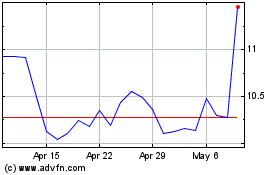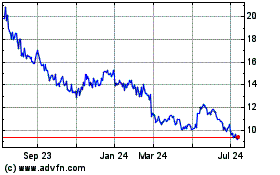By Miriam Gottfried | Photographs by Jose A. Alvarado Jr. for The Wall Street Journal
Blackstone Group Inc. became an investing powerhouse by making
successful bets on undervalued companies. For the next leg of its
expansion, the firm is focused on companies with big growth
prospects, even if it has to pay up for them.
Since Jonathan Gray became Blackstone's day-to-day leader in
2018, he has encouraged the heads of its businesses, who
collectively manage $619 billion of assets, to develop big-picture
convictions and invest in companies or assets that stand to benefit
from those trends.
The new approach has led the New York firm to plow billions into
faster-growing companies -- including in the technology sector --
to which it previously paid less attention.
It has taken Blackstone out of its traditional comfort zone of
turning underperforming companies around through cost cuts and
efficiency improvements -- and juicing returns by employing ample
helpings of borrowed money.
The growth bug has bitten nearly every corner of the sprawling
firm, including its real-estate, credit and hedge-fund businesses.
Among the assets in its main buyout fund is a big stake in Bumble
Inc., which Blackstone acquired in 2019 in a deal that valued the
owner of the dating app at $3 billion. The stake has nearly
quintupled in value as the company's market capitalization shot to
about $14 billion following its February initial public
offering.
Mr. Gray's thematic approach and the growth orientation it has
spawned show how the 51-year-old heir-apparent to Chief Executive
Stephen Schwarzman is making his mark on the firm as it barrels
toward a goal of managing $1 trillion in assets by 2026.
"Investing is about looking forward, but the future is now
coming faster, " he said in an interview. "You want to be exposed
to businesses that benefit from this change."
A big goal of his is for employees in the firm's disparate
businesses to all think about the same themes and discuss them with
each other.
Blackstone has long been interested in identifying growing
industries, but under Mr. Gray has become more clear about what it
won't buy, said Joseph Baratta, global head of private equity at
the firm. In addition to brick-and-mortar retailers, that list
includes established media-and-telecommunications providers and
companies reliant on single-use plastics.
"There are certain types of companies that we're just not going
to invest in, no matter how cheap they are," Mr. Baratta said.
The strategy isn't without risk. The assets the firm is
collecting could be among the first to get hit if, for example, the
recent increase in interest rates continues as the economy emerges
from the pandemic-induced lockdown.
Rivals such as Apollo Global Management Inc. have largely
resisted the allure of the growth strategy, preferring instead to
put money into hard-hit areas like gaming and physical retail. But
even the historically value-focused Apollo has done more
technology-related deals in its most recent buyout funds. The firm
also raised two blank-check companies targeting growth-oriented
deals.
Among the themes that have guided recent Blackstone investments
are the ongoing shift to e-commerce and the technology-fueled
advancement of the life-sciences industry.
The firm has launched a new business dedicated to investing in
life sciences -- including by backing new drugs in the late stages
of development, the last thing a traditional leveraged buyout would
target. It hired Jon Korngold, a veteran of growth-investing
pioneer General Atlantic, to build a new business taking minority
stakes in growing companies.
Blackstone, which previously had virtually no West Coast
presence, has opened a San Francisco office and hired executives
and advisers from technology companies such as Amazon.com Inc. and
Snowflake Inc.
And in November, it hired Jennifer Morgan, former co-chief
executive of business-software giant SAP SE, to lead a team helping
the firm's 200-plus portfolio companies "drive growth through
digital transformation."
Blackstone isn't alone. An increasing number of its rivals and
stock investors have embraced growth as a decadelong bull market
pushes up the price of all manner of assets and leaves fewer and
fewer pockets of value. The two-year rolling average of
purchase-price multiples for U.S. buyouts reached a record 12.8
times earnings before interest, taxes, depreciation and
amortization in 2020, according to an analysis by McKinsey &
Co. That's up from 11.9 times in 2019 and 10.2 times in 2015.
Mr. Gray's thematic push was born from personal experience. He
led Blackstone's $26 billion deal to buy Hilton Hotels Corp. on the
eve of the financial crisis. As the hotel chain's business suffered
during the ensuing economic downturn, outsiders would often label
the deal a failure. Instead, Hilton became one of the most
successful private-equity investments of all time, ultimately
reaping more than $14 billion in profits, or more than three times
Blackstone's initial investment.
Mr. Gray said the experience taught him that the efforts of
Blackstone and Hilton's management may not have been enough if the
company weren't the beneficiary of a long-term growth trend in
global travel, the thesis that underpinned the investment.
"In the fullness of time, what mattered was you picked the right
neighborhood, not the right house," Mr. Gray said.
(Mr. Gray's fondness for hotels abides, witness Blackstone and
Starwood Capital Group's agreement this month to acquire Extended
Stay America Inc. in a bet that a rare bright spot for the lodging
industry during Covid-19 will continue to thrive.)
He also led the firm's first foray into industrial warehouses in
2010, betting on the ascendance of e-commerce around the world.
Blackstone is now the largest owner of warehouses used for
e-commerce, with a roughly $100 billion portfolio consisting of 880
million square feet of such properties around the world.
The two highly successful real-estate bets helped propel Mr.
Gray's rise at the private-equity giant.
One example of how his growth-related themes are being applied
across the firm is Blackstone's April 2020 investment in biotech
company Alnylam Pharmaceuticals Inc. The $2 billion deal consisted
of a $1 billion investment led by Blackstone Life Sciences in a
portion of the future total royalties of a cholesterol drug.
Its credit arm also provided Alnylam with a term loan of up to
$750 million, and Blackstone bought $100 million of the company's
stock. The firm's real-estate business also owns Alnylam's
landlord, BioMed Realty, which consists of 91 life-science
properties. Blackstone last year agreed to sell the company from
one of its funds to another in a deal that valued BioMed at $14.6
billion.
Write to Miriam Gottfried at Miriam.Gottfried@wsj.com
(END) Dow Jones Newswires
March 21, 2021 05:44 ET (09:44 GMT)
Copyright (c) 2021 Dow Jones & Company, Inc.
Bumble (NASDAQ:BMBL)
Historical Stock Chart
From Mar 2024 to Apr 2024

Bumble (NASDAQ:BMBL)
Historical Stock Chart
From Apr 2023 to Apr 2024
